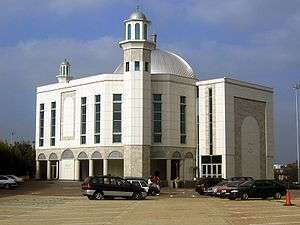Ahmadiyya in the United Kingdom
The Ahmadiyya Muslim Community in the United Kingdom began in 1913 with the pioneering efforts of Chaudhry Fateh Muhammad Sial. Sial was the first missionary sent overseas by the Ahmadiyya Muslim Community and was under the direction of Hakeem Noor-ud-Din, the first caliph of the movement.[1] Not many years after arriving, the need for a mosque in the UK became apparent and in 1926, the Fazl Mosque was formally opened in London and it became the city's first mosque.[2][3] The community expanded and built many mosques and mission houses across the country. The most notable of which is Baitul Futuh Mosque in South London stands as one of the largest in Western Europe.[4]

As of 2017, there are 30,000 Ahmadis in the UK in 150 local chapters.[5][6]
The movement suffers from Sunni bigotry in the UK. They are not recognised as Muslims by the Muslim Council of Britain and are targets for vilification by the Khatme Nubuwwat Academy.[7][8][9]
References
- "28 February - 5 March". Al Hakam. 2020-02-28. Retrieved 2020-04-07.
- "Fazl Mosque". Retrieved May 4, 2012.
- "The Baitulfutuh Mosque- Ahmadiyya Muslim Community: An Overview". www.baitulfutuh.org. Retrieved 2020-04-07.
- Association, Press (2003-10-02). "Western Europe's largest mosque opens in Morden". The Guardian. ISSN 0261-3077. Retrieved 2020-04-07.
- "A religious killing in Scotland: A quiet man with a loud message: A horrific murder prompts fears of more attacks on a small Islamic sect". The Economist. 2 April 2016. Retrieved 2 April 2016.
- "Why Britain's Ahmadis are worried". The Economist. ISSN 0013-0613. Retrieved 2020-04-07.
- "The murder of an Ahmadi". The Economist. 21 May 2016. Retrieved 21 May 2016.
- "Mosque warned over 'kill Ahmadis' leaflets". BBC News. 2019-03-21. Retrieved 2020-04-07.
- Nasser, Tahir (2016-04-25). "The Muslim Council of Britain is failing Ahmadis like Asad Shah | Tahir Nasser". The Guardian. ISSN 0261-3077. Retrieved 2020-04-07.